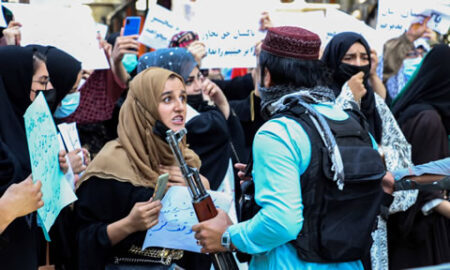The lesson we failed to learn from 9/11: peace is impossible if we don’t talk to our enemies
We should have engaged with the Taliban 20 years ago, but we thought the winner takes all. It undermined our own armed forces.
The fall of Kabul 20 years after 9/11 represents not just the failure of the western strategy in Afghanistan but a wider failure of our overall strategy in tackling the terrorism that gave rise to the attacks in New York and Washington.

There was no real alternative to going after the leadership of al-Qaida after the attacks that cost nearly 3,000 lives; and once the Taliban refused to hand over Osama bin Laden, there was no real alternative to taking on the Taliban themselves. That is why the invasion in support of the Northern Alliance enjoyed widespread support at the time around the world.
The eventual failure is not really the result of “forever wars”, nor trying to “remake nations”, as some suggest. If we don’t have the patience to sustain wars, then we shouldn’t embark on them in the first place. And if we don’t help countries rebuild institutions after participating in a war, then we end up with a spectacular mess like Libya. The challenge is doing these things properly.
The principal failure in Afghanistan was, rather, to fail to learn, from our previous struggles with terrorism, that you only get to a lasting peace when you have an inclusive negotiation – not when you try to impose a settlement by force. In Northern Ireland we tried making peace at Sunningdale in 1973, in the Anglo-Irish agreement in 1985, and in the Downing Street Declaration in 1993 – each time excluding Sinn Féin, and each time we failed to end the Troubles. Having tried everything else, we finally had to talk to the men with guns, and that is why the Good Friday agreement succeeded.
In Afghanistan we repeated the earlier errors in Northern Ireland. The first missed opportunity was 2002-04. I am as much to blame as anyone else, since I was in government at the time. After the Taliban collapsed, they sued for peace. Instead of engaging them in an inclusive process and giving them a stake in the new Afghanistan, the Americans continued to pursue them, and they returned to fighting.
After I left Downing Street, I argued in the Guardian for talking to the Taliban but was contradicted by those still in government, who said it was OK to talk to the IRA and the PLO but not the insurgents in Afghanistan. There were repeated concrete opportunities to start negotiations with the Taliban from then on – at a time when they were much weaker than today and open to a settlement – but political leaders were too squeamish to be seen publicly dealing with a terrorist group.
When the US did start negotiating with the Taliban in 2014 it was to secure the release of Bowe Bergdahl, a kidnapped US soldier. And when official political negotiations finally started in 2018 they were bilateral; failed to include the Afghan government; focused primarily on Taliban undertakings not to host al-Qaida rather than an inclusive internal settlement; and President Trump constantly undercut his negotiators by signalling his intention to leave unilaterally.
Even this year, inclusive negotiations could have succeeded under President Biden, but not after it became clear that US forces were going to leave regardless of any conditions being agreed. All the Taliban had to do was wait.
Now the Taliban have won. They were as surprised as the rest of us to retake Afghanistan so quickly and so completely – and like the proverbial dog chasing the car, now they have caught it they don’t appear to know what to do with it. They have just announced a new cabinet, but face governing a country that doesn’t support them, dealing with a looming humanitarian crisis without funds, demobilising a generation of fighters untrained for any other job, containing the new insurgents of Islamic State Khorasan Province (ISKP), and managing their own squabbles about how much power to share.
They are in danger of making the same mistake we did in 2001 and thinking the winner takes it all. But the country desperately needs international assistance, and at least some of the Taliban leaders know it.
Of course, engagement with groups such as the Taliban is not without moral and political hazard. No one knows if Taliban 2.0 will be a return to the 1990s or something more moderate. They may possibly not even know themselves. But we have a moral debt to the people of Afghanistan, and the only way the international community can help them is to use any leverage we have left with the Taliban to push for an inclusive process in Afghanistan. This should include the protection of the rights of minorities and women, and the establishment of a representative and accountable government.
It will require an international consensus on the steps the Taliban have to take, and a monitoring mechanism to make sure they actually do so. It is in our self-interest to do this: because if Afghanistan does collapse into civil war again, we in Europe will feel the impact in terms of refugees, drugs and terrorism on our streets.
Even more importantly, we have to learn the lessons from Afghanistan elsewhere in the world. How are we going to deal with the armed Islamist groups across northern Africa, in Somalia (another “forever war”), in Mozambique and in Nigeria? Are we going to continue kidding ourselves that we can defeat them by military means alone?
Are we going to continue to refuse to talk to Hamas, and to the other Islamist groups? The lesson from Afghanistan is as clear as it was from Northern Ireland. If we ever want to secure lasting peace then we have to engage with our enemies, not just with those we like.
The first critical step would be for western governments to make it easier to talk to proscribed groups such as the Taliban, and be politically brave enough to do so before it is too late. The UK’s growing raft of counter-terrorism laws were intended to choke off support for extremist ideologies. Instead, the net result has been to criminalise efforts towards diplomacy and political solutions, whether by governments or NGOs. We’re left trying to resolve armed conflicts with one hand tied behind our backs.
In the end we could not defeat the Taliban on the battlefield, nor build a stable new state that shut them out. Our “never negotiate” mantra – eventually replaced by trying to negotiate a hasty exit – undermined the efforts made by our armed forces on the battlefield.
We have to rethink our strategy unless we want to spend the next 20 years making the same mistakes over and over again. Wars don’t end for good until you talk to the men with the guns.
Comments are closed.
